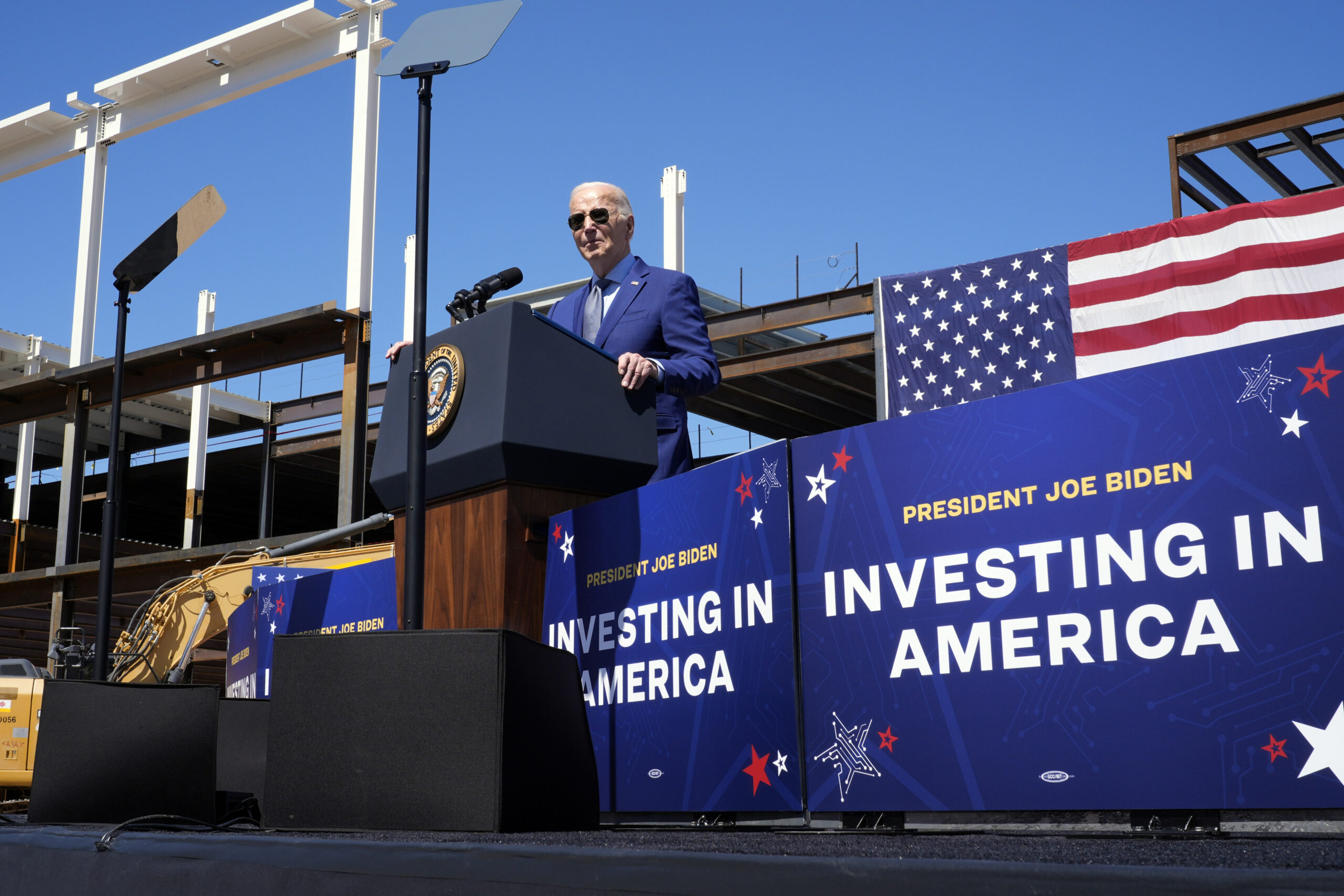

While President Joe Biden‘s campaign this week repeated its hope of expanding his 2024 electoral map to flip Florida and Texas, states former President Donald Trump won in 2020, Trump is holding on to hope he can flip New York and New Jersey.
But although New York could be closer this election cycle, at least according to early polling, Trump has already expanded his map by putting battleground states Biden won four years ago back into play, per some political pundits.
For example, Columbia University political scientist Donald Green downplayed Trump’s hope of flipping New York and New Jersey as “bluster” but contended his 2024 electoral map will likely expand beyond what it was in 2020.
“He wasn’t wrong in saying that he would expand the map in 2016 because he ultimately did win the Rust Belt states,” Green told the Washington Examiner of Michigan, Pennsylvania, and Wisconsin. “What’s bluster and what’s real is obviously a matter of opinion, but it’s almost certainly true that states that were not so closely in play in 2020 are going to be more closely contested this time around.”
“I think of Arizona, in particular, Nevada, Georgia to be among them,” the professor said. “North Carolina went for Trump last time and in 2016 too. It may more decisively this time. Virginia is probably a bridge too far for him, but if Biden’s numbers fall off and there’s a, what’s called by political scientists, uniform relative swing in the direction of Trump, states that are relatively close will become quite competitive.”
A uniform relative swing is more commonly known as a wave election. For instance, if 2 percentage points were hypothetically added to Trump’s 2020 vote totals, “states that he lost, he would win, and many states that were not even that close, would be in contention,” according to Green.
Republicans, independents, and “disillusioned” Democrats are “coalescing” around Trump, according to Trump campaign spokeswoman Karoline Leavitt.
They are becoming members of the “greatest political movement in history” to end Biden’s “chaos” and make America strong, safe, and successful again, Leavitt told the Washington Examiner.
The Biden campaign disagreed, asserting Republican primary results underscore Trump’s political weaknesses, particularly in “suburban areas across the country,” and that he “cannot build the coalition necessary to win 270 electoral votes.”
“Donald Trump has been the presumptive nominee for weeks, and the obvious nominee for weeks longer, and yet, across five primaries last night, nearly 1 in 5 GOP voters voted against him,” Biden campaign spokesman Ammar Moussa told reporters. “In Ohio, eight in 10 [Nikki] Haley supporters say they wouldn’t vote for Trump in the general election, with about half preferring Biden.”
“About 1 in 5, more than 200,000, GOP primary voters in Florida’s closed primary made a point of saying no to Donald Trump. Every single one of those voters is a registered Republican,” Moussa said. “In the critical Arizona county, Maricopa County, nearly a quarter of Republican voters registered their voice against Trump.”
In January, Trump predicted he would make a “heavy play” for New York and New Jersey, as well as Minnesota, New Mexico, and Virginia, pledging to “work them” this election cycle.
“That doesn’t mean I’m going to work them as hard as I work Pennsylvania, where I’m doing very well,” Trump told Breitbart. “But we’re going to do these other states too, and it will be a heavy move… I may rent Madison Square Garden and that’s the belly of the beast, right?”
A month later, Trump and Fox News host Laura Ingraham discussed a “no state or city left behind” strategy during a town hall before the South Carolina primary. Ingraham alluded to a February New York Times-Siena College poll that had Biden leading Trump by 12 points in New York, compared to another survey conducted by the same pollsters last September that had Biden ahead by more than 20 points.
When asked for comment, the Biden campaign emailed the Washington Examiner a hyperlink to a 2020 Trump interview in which he claimed he would put New York “in play” because of high crime rates and taxes.
“We’re going to invest in there, we’ll visit. I’m going to put it down as you know on the list,” Trump told the New York Post. “We think we’re going to win New Mexico, we think we’re going to win Minnesota. We think we’re, we have a shot perhaps at Virginia because they have a very, very strange governor.”
“I’ll solve the crime problem. I’ll solve their tax problem. I’ll solve all their problems. Who would not vote for me?” he said. “We may also do it in New Jersey, by the way.”
While New York could determine the House majority, with six competitive races, three of which the Cook Political Report considers to be Republican toss-up contests, Biden won the state by more than 20 points in 2020. In New Jersey, which could have an interesting Senate race after three-term Sen. Bob Menendez (D-NJ) was indicted on federal corruption charges for the second time in almost a decade last fall, Biden won four years ago by 16 points. Hillary Clinton won New York and New Jersey in 2016 by similar margins.
Simultaneously, a poll conducted by New Jersey’s own Monmouth University that was published Wednesday reported that about half of the survey’s respondents would like to move from the state, though Gov. Phil Murphy (D-NJ), whose wife Tammy is trying to primary Menendez, has a net positive approval rating; 50% approve and 42% disapprove.
“Although just over a quarter say they are very likely to do so, with cost of living being a key factor in that decision,” Monmouth University pollsters wrote in a press release.
There has been no public presidential polling conducted of New Jersey this election cycle.
“I don’t see any path for Trump to make inroads into New York or New Jersey for the general election,” Fordham University undergraduate political science associate Chairwoman Monika McDermott told the Washington Examiner. “Trump relies on his solid base of support with the Republican Party, voters who have stuck with him through good times and bad. In order to change things dramatically in the Northeast, he would really need to find a new appeal. Given his track record recently, that doesn’t seem to be happening.”
“There is, however, the possibility that he can improve his chances in so-called ‘purple’ states, like Georgia and Arizona, and other states where the margin was tight in 2020,” McDermott said. “Given public perceptions about the economy, it wouldn’t take much for him to move that needle in his favor to flip formerly Biden states, assuming negative public judgments of the economy hold.”
CLICK HERE TO READ MORE FROM THE WASHINGTON EXAMINER
Trump does lead Biden in Arizona, Georgia, Michigan, Nevada, North Carolina, Pennsylvania, and Wisconsin, from an average 5-point advantage in Arizona, Georgia, and North Carolina to a 1-point edge in Pennsylvania and Wisconsin, according to RealClearPolitics. He is ahead in Nevada by 4 points and in Michigan by 3.5, per the same polling aggregator.
“One strong note of caution: It is still very early in the contest at this point,” McDermott said. “A lot of things could happen between now and November. And while the old trope about turnout being key is trotted out every election year, this time around, it seems especially relevant as the public clearly lacks enthusiasm for this rematch. Given this context, the ardent nature of Trump voters’ support could be the key to him winning another term.”






